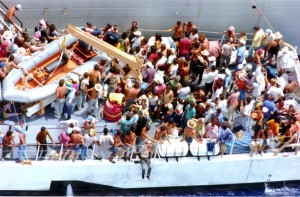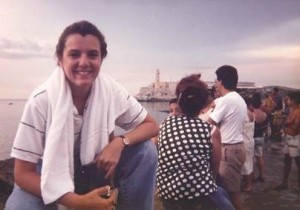
By Mark Young, SouthFloridaReporter.com Managing Editor – The following article will serve as an introduction to our latest contributor, Patty Vila. Patty is a highly regarded expert on Cuba. Patty was born in the US and her parents are Cuban. Patty had been a Cuba-based producer/reporter for CNN. Patty resides in South Florida but will be traveling back and forth to Cuba and will be filing reports for the South Florida Reporter.
This year marks the 35th anniversary of the Mariel Boatlift, and the 21st anniversary of the Cuban Rafters crisis. Patty takes us back explaining what the Mariel crisis meant not only to her family, but also thousands of other Cubans.
“The rafter crisis would come to be because of the widespread poverty and the Cuban people’s discontent of what was happening on the island. This all started when the economic support from the USSR came to an end. Tens of thousands of Cubans left in small boats, homemade rafts and frankly anything they could find that would float. This sea exodus had thousands of Cubans fleeing looking north for a better life. I often wonder what would have been of my life had I been born in Cuba. “ – Patty Vila

By Patty Vila, SouthFloridaReporter.com, Cuba Expert, August 6, 2015 – The Mariel situation was a turning point for me. It was 1980 and I was 11-years-old. My family had a second house in the Florida Keys where we were all vacationing for a few days. I remember there was a lot of commotion at the house on that fateful Saturday afternoon. My parents, grandparents and extended family members were nervous. It was getting loud. My Uncle Braulio was preparing to take a 54-foot yacht to Mariel to pick up family and friends. My dear mother, Hortensia, called her father, my grandfather, who was living in Havana. We had never met my grandpa and my mother had not seen her Dad since she had left Cuba in 1959.
My mother said to her father, “Papi, my husband’s brother is going to Mariel to pick up family and friends. Do you want to come to Miami?”
The decision that my grandfather made would seal his fate. He said “No, I am too old to come to a new country and start over.” My mother became very sad but accepted his decision.
My mother left Cuba or should I say, she was taken from Cuba when she was 13 years old. My grandparents were divorced. My grandmother, Cuca, came to the United States with her three children. My mother was the youngest. My grandmother left with her three children because she knew that Fidel was a communist. My family did not believe in the system. My grandfather said, “I will see you in six months when this is all over.” My grandfather, Conrado Urquizu, died in 1986 never seeing his children again or never having the chance to meet his grandchildren.
When I was a teenager growing up in Miami, I would always ask myself, “Am I Cuban or am I American?” These are issues that young children and teenagers ask themselves all the time. This is a question that not only young Cubans ask themselves but almost every first generation Hispanic questions.
My passion for Cuba became even stronger when I would start working for CNN in 1993 while I was in my early twenties. Every few weeks I would ask CNN Miami Bureau Chief John Zarrella to send me any big Cuba stories. In August of 1994, nine days after the Rafter crisis started, my dream came true. I was sent to Cuba with gear, tapes, camera and fifty thousand dollars in cash.

I stepped foot in my parents’ country. The country that my ancestors were from. My country! I started to find my roots as a young adult and especially as a young woman. I was shuffled away in a van that had the windows covered with blinds. I am not sure why, but the driver said, “Please keep all windows covered and closed,” and I said “Esta bien.” The driver took me from Jose Marti Airport to the posh neighborhood of Vedado, to the Hotel Victoria, which is currently being remodeled.
I stayed for almost two weeks covering the rafter crisis, my first big breaking news story and a gut-wrenching story to bring to viewers all over the world. We went to Mariel every day to cover this and do live shots for CNN and CNN International. The story was told, live, every day. We saw Cubans getting on make-shift rafts and sail off, not knowing if they would make it or not. As the story started coming to an end, my emotions were up and down like a roller coaster.
When I landed back in Miami, my first call was to Juanita Castro, Fidel and Raul’s sister. She never gave interviews. When I called her, the initial answer was no, but somehow God gave me the right words to say to convince her to change her no to a yes. My camera crew and I drove to her pharmacy. We conducted the interview in a very small cramped room. She shared her emotions of the crisis with me. She told me once she had set foot on American soil, she had never spoken to Fidel. The story affected her greatly. Once the cameras were off, we had a few words that will remain in my soul until we both pass. She and I both cried. I showed her hand-written notes from many rafters that had left the island. They rafters asked the entire CNN team to please call their relatives in the states and let them know that they were getting on a raft. We all did. Some of them made it, others did not, and others I just don’t know.
This month marks 21 years since the rafter crisis. As we all reflect on the history of Cuba, let us pray that we have a peaceful relationship between two counties with dignity and respect. Let’s continue to pray for the souls that have perished as well as for the Cuban people and children that are aspiring to have a better life.












